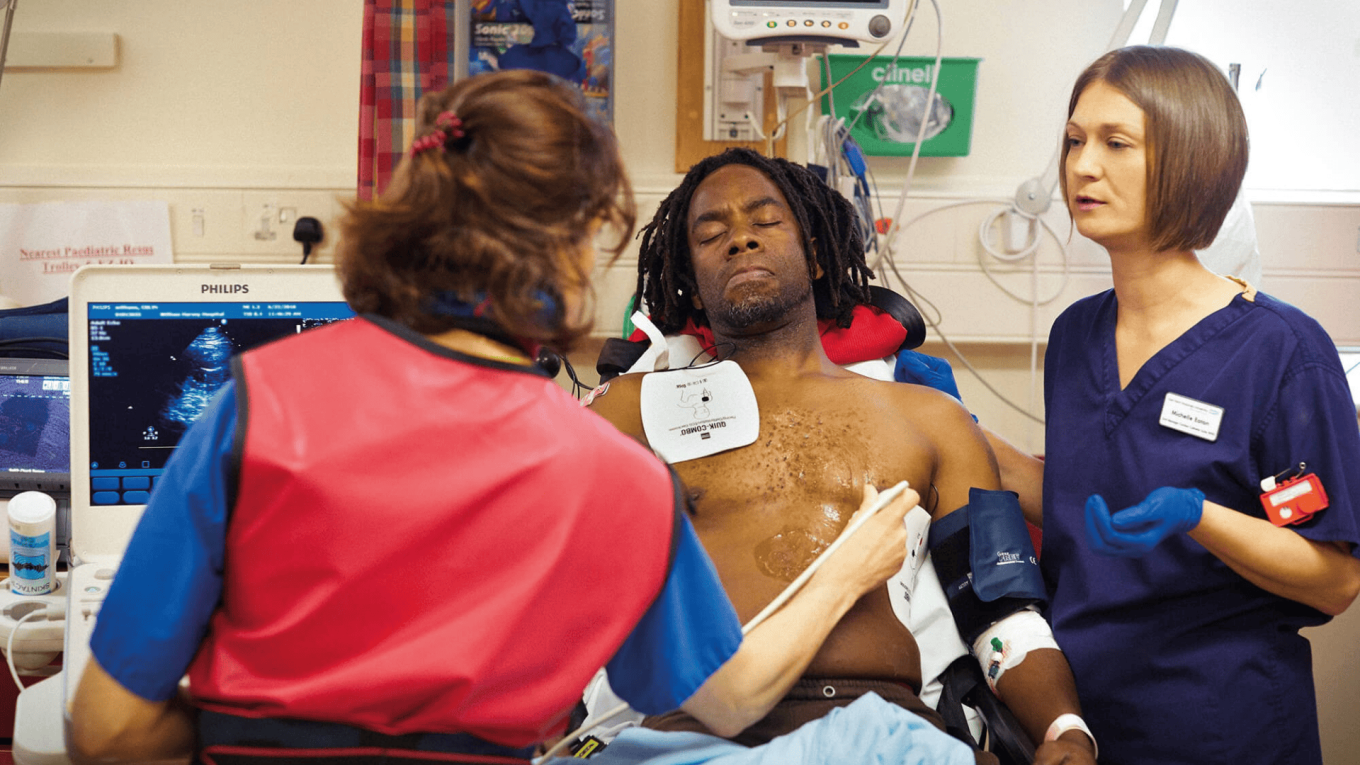
Adult nursing
Adult nursing offers a meaningful career where you’ll support people through some of their most vulnerable moments, from acute hospital care to long-term recovery in the community. You will apply clinical skills and knowledge and build therapeutic relationships to care for patients effectively.

On this page
Introduction to the role
Being a nurse means making a difference every single day. As an adult nurse, you’ll care for people aged 18 and over when they need it most, helping them through injury, illness or long-term health challenges. It’s a role that’s all about people, teamwork and using your skills to improve lives. Whether you’re supporting someone through recovery or helping them stay independent, you’ll be making a real impact.
Adult nurses make up the largest part of the nursing workforce in the NHS. They work across hospitals, care homes, specialist clinics, GP practices and in the community, leading care and working closely with doctors, physiotherapists, mental health teams and many others. It’s a fast-moving and flexible role that puts you at the centre of patient care.
You’ll meet people of all ages and backgrounds, each with their own stories and needs. That means being an adult nurse takes empathy, communication and the ability to think on your feet. It can be challenging but it’s also one of the most trusted and rewarding careers out there.
Right now, there’s a growing need for adult nurses across the UK. With great job prospects, financial support while you study and so many ways to progress, it’s a career that opens doors and changes lives.
About the role
What does an adult nurse do?
From day one of your training and into your career, you’ll gain the skills to assess patients’ needs, provide tailored care, and reflect on how well it’s working. A key part of the role is building trust with each person you support, aiming to enhance their quality of life, whatever their circumstances. You’ll often be balancing multiple priorities to ensure every patient gets the best care possible.
Adult nursing involves working with people living with a wide range of conditions, from long-term illnesses like diabetes or arthritis to sudden health issues such as injuries or infections.
Teamwork is vital and you’ll collaborate closely with a range of professionals including occupational therapists, radiographers, pharmacists and healthcare support workers, as well as patients’ families and carers.
What are the pay and conditions like?
As an adult nurse, a full-time job is 37.5 hours a week, however there are opportunities to work part-time. Many healthcare services provide 24/7 care, therefore you may be expected to work across various shifts which include days, nights, weekends and bank holidays. Employers will review flexible working requests and patterns on an individual basis. Most newly qualified nurses start on band 5 of the NHS Agenda for Change pay scale.
You’ll also benefit from access to the NHS Pension Scheme, a wide range of staff discounts, and at least 27 days of annual leave, plus bank holidays.
Where adult nursing can take you
Once you have qualified as an adult nurse, a wide range of opportunities can open up. You could:
- specialise in a certain field such as operating theatres, care for the elderly or intensive care
- work in the community or social care
- use your skills in the charity or independent sectors
- move into leadership, management, teaching or clinical research
The possibilities are endless.
Meet Michelle, an adult nurse in the NHS
Meet Michelle, an adult nurse in the NHS
Person specification
Is Adult Nursing right for you?
Being a nurse isn’t just about qualifications. Adult nursing is all about people, so you’ll need to be confident working with a wide range of individuals, often in challenging situations. That means using your judgement, staying professional under pressure, and knowing how to support and guide others, whether that's a patient, a colleague or a family member.
Ask yourself:
- Can I explain things clearly and calmly?
- Am I confident advising or supporting others?
Do your values align with the NHS?
Whether you're applying through university or directly to a role in the NHS, you’ll need to show that your personal values match those in the NHS Constitution. These include compassion, respect, a commitment to quality, and putting patients first. It's not about ticking boxes. It's about showing how you live these values in real situations.
Ask yourself:
- Do I treat others with kindness and respect?
- Am I committed to making a positive difference?
Find a course with UCAS
Want to explore the next step in traditional degree routes into the NHS? Explore courses related to adult nursing with UCAS today.
Entry requirements and training
Studying nursing at university
To become a registered adult nurse, most people apply for a degree course . These are usually full time and take around three years to complete. They combine academic study with hands-on training in a range of clinical settings. You will spend around half your time studying at university and half gaining practical supervised experience in a range of healthcare settings.
Entry requirements will vary depending on the university, but you’ll typically need:
- at least five GCSEs at grade 4/C or above, including English, maths and a science
- two or three A levels or equivalent qualifications, such as a BTEC or T Level
Some universities offer foundation year options if you do not meet the standard entry criteria. If you already hold a degree in another subject, you may be able to apply for an accelerated course lasting around two years.
How to apply
To apply for a full-time nursing degree, you’ll need to submit your application through UCAS. As part of the process, you may be invited to an interview or selection day. This is your opportunity to show your motivation, understanding of the profession, and how your values reflect those of the NHS Constitution.
Work or volunteer experience in health or care settings can help strengthen your application.
Other routes into nursing
There are also alternative routes to becoming a registered nurse, including:
- Nursing degree apprenticeships, which allow you to train and earn a salary at the same time. These are offered by some NHS employers in partnership with universities.
- You could first train to become a nursing associate. This is a registered professional role, regulated by the Nursing and Midwifery Council (NMC). They provide essential care across diverse settings and are individually accountable for their practice. For those who wish to, the role can also serve as a route into registered nursing through further study.
Some employers support existing staff through training while they continue working.
Find out more about Routes into NHS with UCAS.
All nursing courses in the UK must meet NMC standards of education and training but programmes vary in their content, the way they are structured, and how they are taught and assessed. The facilities available and amount of support and supervision may also differ from course to course. Find out more by looking at university websites and prospectuses, attending university open days and contacting admissions staff.
Work experience
Applying for a course or apprenticeship in Adult Nursing is going to be competitive. If you're seriously considering it, it is a great idea to try and gain some prior work experience to strengthen your application visit NHS England to find out more about gain work experience for NHS Careers.
Financial help at university
You could receive at least £5,000 a year to help fund your studies while at university in England. Your personal circumstances and the course you choose may mean you could receive more. And the good news? You'll never have to pay it back.
Explore NHS Careers
There are over 350 different NHS careers and everyone makes a difference every day. Whether you’re still in education or thinking about changing careers, you'll get the information you need.